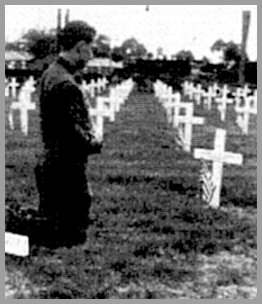Written by Eugene
I have often reflected on the decorated histories of the veterans
in our family. My father fought on the fields of Belgium, France and Luxembourg
during WWII. He was wounded and received the Purple Heart medal for his
heroic actions during the Battle of the Bulge in the winter of 1945.
(Click
to to visit a site that describes this historic battle)
Twenty-seven years earlier his father, Joseph J. Jones I, was wounded
in combat while fighting in WWI. He was also awarded the Purple Heart
for being gassed on March 21, 1918 in France.
We also lost one of our ancestors on the fields of France during WWIl. Maurice G. Jones was Grandpa's younger brother. He was also my father's best friend who served as Best Man during my parents' wedding in 1943. My middle name was granted in his honor. He was killed in action in August of 1944.
I often remember talking with my father about his experiences during the war. I would travel with him regularly during the summer months on his sojourns from Valley Stream to the store in Stony Brook. This provided me with opportunities to speak with him privately and he shared his thoughts with me openly. I asked questions poignantly in a manner I suppose only a child could get away with.
One of the questions I remember distinctly asking was, " Did you ever kill someone where you knew it for sure? " He spoke humbly and softly, "Yes ", he said. "I remember once we were in a defensive position in a foxhole. A German offensive was launched against us and enemy soldiers were approaching across an open field. I fired at one and the man fell. "That's for Uncle Marcy," he recalled saying out loud.
This is how my father was able to deal with the guilt of taking the life of another man. I can't imagine what it must have been like for him. I salute him and all the members of our family that have served in our Armed Forces. I never really thought about the fact that this fighting spirit dates back to the Civil War era when my Great-Great Grandfather served in the US Navy. Perhaps this esprit de corps is the precursor to our battles on the football field during our annual Thanksgiving Day Turkey Bowl.
Joe
Jr. at his Uncle Marcy's Grave
-- France 1945 --
Note:
Anna still has all the letters Joe sent her while serving overseas. In a letter dated June 3, 1945 he describes the above visit to his Uncle Marcy's grave.
"On our way back we stopped at St. James cemetery. I already had the plate and grave number so it was easy to find. I'm not going to write much because . . . well, you know how I must have felt there. I was able to compose myself to take some pictures and leave the Sacred Heart medal that my father gave to me before I came overseas there on his grave. Well, I'd better stop there because there is a lump in my throat again."

